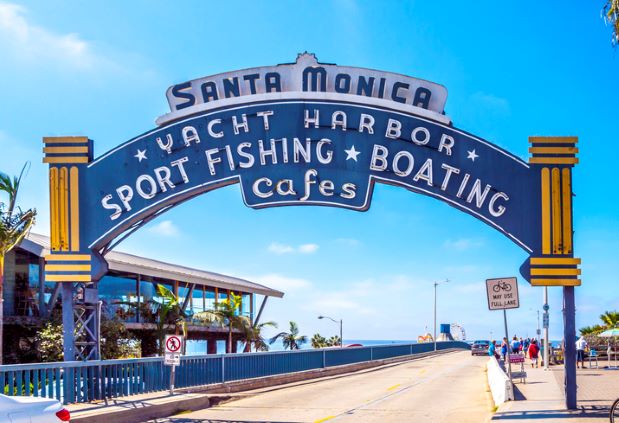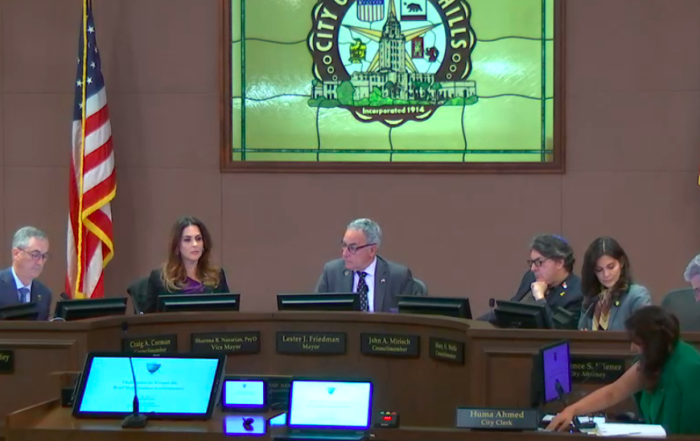One can always count on a busy election season in Santa Monica. But even for that very active seaside town, nine local ballot measures are a lot to digest. The following are our recommendations (some earning more explanation than others).
Measure SMC – “To improve access to affordable education for local students, veterans, first-generation college students; provide affordable housing for homeless students; modernize instructional labs for nursing, healthcare, sustainability, media, science career training; repair/upgrade obsolete vocational classrooms/aging facilities, shall Santa Monica Community College District authorize $375,000,000 in bonds at legal rates, levying 2.5 cents per $100 assessed valuation, raising $23,000,000 annually while bonds are outstanding, with citizens oversight, public spending disclosure?”
Vote YES. Part of a larger Master Plan, Measure SMC is consistent with a line of bonds over the last 22 years that have revolutionized Santa Monica College into an even more impressive jewel than it was before the turn of the century. At $375 in bonds, it also helps keep SMC competitive with L.A. Community Colleges, which also have a measure on the ballot this year for an even greater $589 Million.
Consider the following benefits and meaningful investments Measure SMC would provide:
- Replacing and upgrading obsolete classrooms and instructional labs. Currently, several professional training programs are being conducted in classrooms once fitted for metal and wood shop
- Improving access to new career training programs including respiratory therapy, fashion design and photography (that are currently stuck in those old shop classrooms)
- Providing technology and facilities for hybrid in-person and online learning
- Upgrading the college’s Veterans Support Center
- Assisting with replacing Malibu High auditorium to support media studies and public programs
- Housing for SMC’s homeless and qualified low-income students with priority for local families and individuals
- Constructing a Santa Monica College Police Department sub-station to improve public and campus safety
- A state-of-the-art language learning center
The Malibu City Council recently complained Malibu doesn’t get enough. Really? Well, don’t look now, but a state-of-the-art, $80 Million campus is about to open in Malibu after years of work. What’s more, it will cost a great deal to maintain over the years, with SMC supporting those costs. In addition, the Malibu Chamber of Commerce and several Malibu residents who attended SMC support the measure. We strongly suggest voters do too.
Measure GS – “Shall the measure adding Santa Monica Municipal Code Chapter 4.90 to establish designated funds for schools, homelessness prevention, and affordable housing, and an eleven-member resident oversight committee, and amending Chapter 6.96 to provide a third tier transfer tax rate of $56.000 per $1,000 of value for property transfers of $8,000,000 or more, providing an estimated $50,000,000 annually for homelessness prevention, affordable housing, and schools, until repealed, be adopted?”
Vote YES. Measure GS raises the real estate transfer tax by 5 percent only on the highest-end properties up for sale in Santa Monica, and will provide 20 percent of much-needed funding for our schools while sending 80 percent to homelessness prevention and to fund affordable housing production. While only affecting a few dozen of the wealthiest properties per year, it will generate about $50 million annually – that’s real money to solve real problems brought to us by those that can most afford it.
In addition to Westside Voice, Measure GS is supported by groups and organizations we support and trust, including Santa Monicans for Renter’s Rights (SMRR), the Santa Monica Democratic Club, and its chief sponsors, Mayor Sue Himmelrich and her husband, Michael Soloff.
Measure DT – “Shall the measure to enhance the City of Santa Monica’s general governmental services by increasing the one-time tax on real property sales over $8 million, and establishing an additional incremental tax of $25.00 per $1000 of the value in excess of $8 million, excepting transfers: per State law, involving tax-exempt charitable organizations, and certain ground leases; providing an estimated $12-25 million annually through February 28, 2033, subject to a five-year extension by Council supermajority vote, be adopted?”
Vote NO. This is a disingenuous measure meant to sound “cheaper” and “more reasonable” than Measure GS. It’s a complete distraction – don’t be fooled. If we’re only talking around 50 properties a year selling at the $8 Million mark or more, why not go after real money that’s going to make a real difference for people? This measure half-asses it and completely attempts to undermine Measure GS. We ask voters to reject it with prejudice.
Measure DTS – “If the “Comprehensive Real Property Transfer Tax Measure” is enacted, should at least 30% of its additional revenue be used for housing assistance to protect seniors and low-income families from housing displacement, with the remainder of the additional revenue to be used for homelessness services; behavioral health services; public safety and emergency response teams for City streets and parks; reopening public libraries; after-school programs; and crossing guards near public schools?”
Vote NO / NO RECOMMENDATION. We’re voting NO on Measure DT, so we don’t really see any reason to vote for this companion, advisory measure that allows the public to weigh in on whether the money raised by Measure DT should carve out at least 30 percent for the specific projects listed. But we’re certainly not recommending that anyone vote against any of the services listed.
Measure RC – “Shall the City Charter be amended to require intended owner occupancy of rent-controlled units for two years before tenant eviction; require owner occupancy within 60 days of vacancy; reduce the maximum Annual General Adjustment from 6% to 0.8% from 2/1/23 through 8/31/23, or average not to exceed 3%, with a 3% maximum Annual General Adjustment thereafter; and require elections only if the number of qualified candidates exceeds the number of open Board positions?”
Vote YES. Back in 2012, when he was a Rent Control Board Commissioner, Westside Voice Publisher Todd Flora was one of the major sponsors of Measure GA, which did two things: One, it amended the annual general rent adjustment/increase from a very convoluted formula to simply being .75 percent of the consumer price index. Second, it capped any annual increase to a maximum of six percent. At the time, we never envisioned inflationary times like the late 1970s and early 1980s returning again. But they have. In addition, a dangerously high number of Santa Monicans are becoming rent burdened, spending over 40 or 50 percent of their income on rent. Many face the possibility of not being able to make rent each month. People are being evicted. Measure RC would roll back that six percent maximum – including the one that took effect September 1 – to a maximum of three percent for any given year. We must help renters while allowing landlords a reasonable return.
The measure would also save the city a little money in avoiding an election any time the number of candidates for the Rent Control Board equals the number of open seats. We strongly urge support.
Measure EM – “Shall the City Charter be amended to allow the Rent Control Board to disallow or modify annual general rent adjustments for rent controlled units during a declared state of emergency by the President of the United States, the Governor, the Los Angeles County Department of Public Health Officer, or the City Council or Director of Emergency Services while maintaining the landlord’s ability to petition for a rent adjustment per Section 1805 of the City Charter?”
Vote YES. The Rent Control Board (RCB) shouldn’t have to wait for the city council to empower it to act in times of emergency. The RCB should be given the respect and authority it deserves. This measure would cut out the middle people and allow the RCB to act swiftly and autonomously to help renters in times of declared emergency.
Measure CS – “Shall the City of Santa Monica increase the transient occupancy tax – which is paid entirely by overnight visitors – by 1% for hotels and motels, and by 3% for home-shares, providing approximately $4.1 million annually, until ended by voters, with all funds benefitting Santa Monica?”
Vote YES. It will raise much-needed funding while keeping the city’s hotel bed tax competitive with surrounding cities. Specifically, it will go to city services such as homelessness response, cleaner, safer sidewalks, parks, and beaches, and fund improvements to 9-1-1 call time response.
Measure PB – “Shall the City Charter be amended to: (a) expand eligibility requirements for service on the City’s Personnel Board to include, in addition to City of Santa Monica (“City”) residents, residents of Los Angeles County that are employed full-time within the City, or own real property in the City, or have been issued a business license by the City; and (b) reduce the term of service for Personnel Board members from five to four years?”
Vote YES. Much controversy has surrounded the Personnel Board, including the fact that the current language of its charter requires appointees to be a resident of the city. This measure allows for people who work in Santa Monica and perform most of their job functions here to serve, as well as persons who own real property in Santa Monica. It also aligns a four-year appointed term with most other city boards and commissions.
Measure HMP – “Shall the measure to establish a business tax on every licensed cannabis business (including adult-use nonmedicinal cannabis retailers, distribution, manufacturing, cultivation, laboratory testing, or any other licensed cannabis business) and retailers of products containing psychoactive cannabinoids, including cannabinoids derived from industrial hemp, up to 10% of gross receipts on cannabis and/or hemp-derived psychoactive products sold in the City, which all together could generate an estimated $3-5 million annually until repealed, be adopted?”
Vote YES. The measure finally codifies a reasonable tax level for cannabis and hemp businesses to pay for being able to operate in Santa Monica. It only raises a few million annually, but it’s important to finally have this on the books.
Photo Credit to Meinzahn
Stay informed. Sign up for The Westside Voice Newsletter
By clicking submit, you agree to share your email address with Westside Voice. We do not sell or share your information with anyone.








